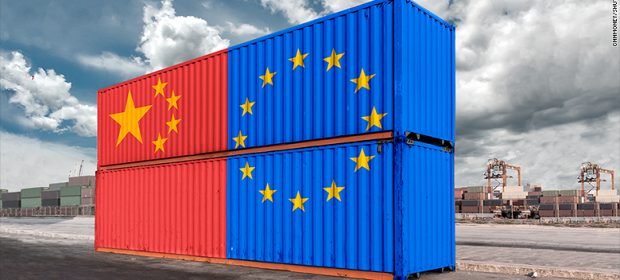You put yourself in a lot of danger when you lock yourself with a madman and throw away the keys. This is exactly what Europe did with China. It befriended China and got perilously dependent on the fast-growing Chinese economy. Now, the end of China’s export-based economy seems imminent and the end of China could very easily mean the end of Europe.
How dependent is Europe on China
Highly dependent. To put it simply, China is the biggest trade partner of the European Union. The EU-China trade in 2020 stood at a mammoth $709 billion. China also enjoys a massive trade surplus of $219 billion over the European Union.
China exports everything to the EU from raw materials, batteries, active pharmaceutical ingredients, hydrogen, cloud and edge technologies, and metals like aluminium or steel. In fact, European businesses are dependent on Chines inputs and raw materials for their operations. Europe’s dependence on China is so high that it would actually fail to celebrate Christmas if the Chinese exports industry gets hampered.
In fact, as China’s manufacturing activity declines rapidly due to a coal and power crisis in the Communist nation, Europe actually has no viable alternative for procurement of raw materials to keep its industries running.
France and Germany remain dependent on China
Even the biggest of European economies- France and Germany remain dependent on China.
- Germany-China trade ties
When it comes to Germany, the situation is particularly bad. China has been Germany’s biggest trade partner for the last five years. The bilateral trade between Germany and China reached $258 billion in 2020. China enjoys a massive trade surplus of $20.24 billion over Germany.
More than the trade deficit with China, it is the dependence of German businesses on China which can hurt Berlin. German exports to China account for over half of EU exports to the Communist nation. Moreover, scores of German companies like engineering equipment-maker Siemens, car giant Volkswagen and chemical maker BASF have been involved in China since the 1980s.
Many German companies like BASF produce locally in China and with China cutting down on manufacturing amidst a power crisis, such German businesses are bound to suffer big losses.
Moreover, the famous German car industry is largely dependent on the big Chinese market. It is, for example, frequently mentioned that German carmaker Volkswagen sells 4 million cars in China every year out of the 10 million sales worldwide.
- Sino-French trade ties
France is comparatively less dependent on China. In the list of France’s trade partners, China comes at the seventh spot. However, the pharmaceutical industry is a cause of concern for Paris as France imports 80 per cent of the raw materials for active agents in some drugs from China or Asia.
Last year, when China got hit by the Coronavirus Pandemic, the French automobile industry also had problems in sourcing brake pedals. Moreover, France is China’s biggest wine supplier and the Chinese wine market is a major source of income for the French wine industry.
Germany and France unable to decouple from China
Moreover, both Germany and France are overly dependent on China for the import of basic goods, medicines and technology. The two countries have faced steep challenges in a post-COVID world even as the risks of associating with China in a volatile world order became clear.
The two European powers tried to encourage their business houses to move away from China. However, there were no positive results as European businesses have got so deeply entrenched in China that they cannot be removed out of the Communist nation in a short period of time.
Moreover, the EU as a whole doesn’t have much presence in the Indo-Pacific, which could have helped it move away from China. On top of it, German Chancellor Angela Merkel has antagonized India, the only market that can solve Europe’s China problem.
Earlier this year, Merkel said, “We now have a situation with India where, in connection with the emergency situation of the pandemic, we are worried whether the pharmaceutical products will still come to us.” Merkel is the de facto leader of the European Union and her distasteful remarks have ended up alienating India at a time when the EU desperately needs it to order to mitigate the losses that the European Continent is bound to suffer due to China’s imminent downfall.








